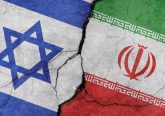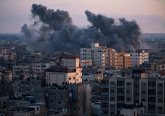Over Gaza, the international criminal justice system (ICJS), spearheaded by the International Criminal Court (ICC), must pick a trench: Does international criminal justice entail the active involvement in humanitarian relief and prevention in conflict zones? I call those who support this proposition, “legal activists”, for a lack of better terminology. Or might, in contrast, the sole objective of ICJS operations be the realisation of ex-post justice, as “purist” interpreters of international criminal justice usually espouse? This post argues that these two objectives are not mutually exclusive. Instead, I argue that a legal activist approach in situations of acute conflict facilitates ex-post justice in the long run.
Gaza, War Crimes, Silence
The ICC’s Chief Prosecutor’s Office has been investigating war crime allegations in the occupied Palestinian territory since 2021, primarily examining the Israeli war on Gaza in 2014. However, during the unfolding of events in October 2023, the ICC has remained remarkably silent.
In October 2023, Israel responded to Hamas’s surprise attack by cutting off humanitarian supply into Gaza. Israel, holding Gaza under siege, cut off the supply of water, food, fuels, and electricity, which “will undoubtfully cost civilian lives and constitutes collective punishment”, according to the United Nations.
Meanwhile, pressure on the ICC is steadily increasing. Tom Dannenbaum, associate professor of international law at the Fletcher School of Law & Diplomacy, has spoken up against the crimes related to the siege order, stating that “The starvation of civilians as a method of warfare, is a violation of international humanitarian law and a war crime [ICC Statute, Article 8, 2b, xxv].” Several human rights groups have accused Israel of using white phosphorus munitions, in violation of international humanitarian law as white phosphorus causes an “indiscriminate” danger to civilians [Common Article 3 to the 1949 Geneva Conventions]. Adding to this, international legal practitioners in support of Palestinian Human Rights and Palestinian organizations monitoring and documenting violations of international humanitarian law against Palestinians have issued a series of letters to Karim Khan, Prosecutor of the International Criminal Court, urging him to act immediately in relation to the military offensive on the Gaza Strip:
“Specifically, we are calling on the Court to urgently issue arrest warrants for the cases currently before your office; to investigate the crimes which have taken place and are being orchestrated across the occupied Palestinian territory since 7 October; to issue a preventive statement and visit Palestine before the end of 2023.”
Khan was vocal after Russia attacked Ukraine on February 24, 2022. Four days after the invasion, he announced that his office would open investigations into possible war crimes. In response to Gaza, his office has thus far remained silent. Many human rights practitioners lament the silence. An overdue signal that the ICC is monitoring the situation would, at the very least, “let victims know they are not abandoned”, said Adil Haque, law professor at Rutgers University.
What is more, some legal practitioners, scholars, and the media have pointed to the legal definition of genocide contained in Article 2, Genocide Convention, 1948. Many scholars and practitioners interpret the Genocide Convention as giving rise to obligations on parties signed to the Convention to intervene, including militarily, when a genocide occurs. However, as the verdict in the Bosnian Genocide case made clear, the mere fact that a genocide has occurred does not mean that all signatories have a legal obligation to intervene. It is unclear what the Bosnia verdict tells us about unfolding genocide and the obligation to prevent genocide, but absent direct state-responsibility, there is thus far no legal obligation to take direct unilateral action. I disagree with the verdict. As I will explore in more detail below, I think an active participation requirement can be extrapolated from the conditions necessary for eventual reconciliation after conflict.
Slow Justice?
This takes us to a common critique levelled against the ICC by human rights practitioners: The failure to deliver justice quickly, and the inability to work actively in a peacebuilding capacity. ICC proceedings are criticised for “slow justice”. When justice is “slow”, urgent needs of affected societies, directly concerned with repair, restoration, humanitarian relief, and peacebuilding are always disappointed. Those who accuse the ICC of “slow justice” want the institution to exert immediate political power in conflict zones. I call those espousing this view legal activists. The recent events in Israel and Gaza once again make this critique pressing. Palestinian organizations monitoring and documenting violations of international humanitarian law call for a legal activist approach. Many international human rights groups, too.
Opposing this, purist interpreters of international law consider exerting political agency outside the remits of international criminal law, and the law more broadly. These purists see the international criminal justice system as solely the ex-post arbiter of conflict. In their view, the law must not take on politics’ chores.
In this distinction, the politically minded legal activists and the purists construct a major false dichotomy that these positions are irreconcilable. These two views––the legal activist and judicial purist––are not mutually incompatible. Rather, in situations of immediate conflict, an activist approach to the international criminal justice system has positive ramifications, potentially not only on instant humanitarian relief and prevention in conflict zones, but also, ultimately, on the realisation of ex-post justice.
Legal Activism or Ex-Post Justice?
I disagree with the decision in the Bosnian Genocide case. I think an active participation requirement can be extrapolated from the conditions necessary for eventual reconciliation after conflict. If the traditional goal of criminal trials is the ex-post adjudication of guilt or innocence, the active participation in immediate justice will assist this goal, not divert from it. Actively monitoring the starvation of civilians as a method of warfare, a violation of international humanitarian law and a war crime [ICC Statute, Article 8, 2b, xxv], for instance, will facilitate any ex-post arbitration efforts, not, as perhaps it is feared, interfere negatively with fact-finding and truth-seeking endeavours.
What is more, I think it is reasonable to expect that the ICJS’s active ad hoc involvement in conflict is a necessary precondition for the success of eventual criminal proceedings. Why would forensic fact-finding processes beginning with monitoring the deed, and responses to breaches of ICJS statutes not have immediate effect?
Critics wills say that this activist model gives criminal trials a much broader meaning beyond adjudicating guilt or innocence. Indeed, this may seem like an unfair burden to carry for the international criminal court system, which, at the end of the day, has been designed to adjudicate crimes rather than to act in peacebuilding and crime preventive capacities. Criminal trials are concerned solely with individual accountability and culpability, not with the causative structural and societal conditions that enable and facilitate crime.
I think this is view is myopic. Even if one’s self-imposed goal is exclusively the attainment of ex-post justice, the international criminal justice system still seeks accountability (and not exclusively criminal accountability), as Theodor Meron argues. It seeks truth-finding, reconciliation, reparations, and institutional reform. These are future-directed political goals outside the remits of pure criminal accountability. It would be arbitrary and misguided to wait until the end of conflict for these objectives to be addressed.
International criminal trials on their own––as the Bosnia case indicated––are usually unable to thoroughly address the more complex political reality of a conflict’s consequences and post-conflict transition. Yet, without addressing these consequences, criminal proceedings on the international level will neglect a necessary component for the establishment of ex-post justice. Hence, if ex-post justice requires political involvement, as both purists and activists agree, immediate political agency can only be beneficial to the system’s objective.
Extrapolating from this, it is in the ICC’s best interest to adopt an activist approach to the conflict in Gaza and to practice an approach that recognises the immediate juridical involvement in conflict as a prerequisite to ex-post justice. The international criminal justice system should not fear “political” involvement in situations of crisis. Rather, any “political” involvement which may occur is in the ICJS’s own best interest.
This article was originally published in the NYU Journal of International Law and Politics (JILP) and is republished here under a Creative Commons licence.







